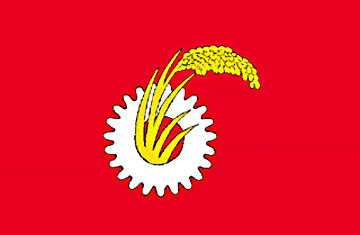
Japanese Communist flag.
Cute as Hello Kitty, 19-year-old Michiko Suzuki looks like any of the thousands of teens haunting the street fashion stores of Tokyo's youthful Harajuku district. But when the Wako University student takes time off from study sessions dissecting Marx to hit the street, it's usually in order to distribute political literature. To her classmates, the party may be something to which you bring the karaoke machine, but Suzuki knows it's really the revolutionary vanguard of class struggle. That's because Suzuki is a teenage communist.
Bolshevism runs in her family: The daughter and granddaughter of party members, she joined the Japanese Communist Party (JCP) as soon as she turned 18. "I think it's cool to see [fellow members] struggling unyieldingly," says Suzuki, smiling shyly. "I really love that last word."
The idea of a communist party soldiering on in the world's second-largest economy more than 15 years after the collapse of the Soviet Union may invite comparisons to Japanese soldiers who remained hidden on isolated Pacific islands because nobody told them World War II had ended. But the JCP is far from extinct: It claims some 400,000 members, and earned 7.3% of the vote in the most recent legislative elections, in 2005 — that's 4.36 million voters.
"The JCP is probably the most successful non-ruling communist party in Asia, if not the world," says Lam Peng-er, a research fellow at the National University of Singapore's East Asian Institute.
That success has its roots in the party's long history in Japan. Born in 1922 as the Japanese branch of the Communist International, the international federation of Marxist-Leninist parties created by Moscow, the JCP quickly adapted itself to local conditions. It was one of the few Japanese groups to stand up to the rise of Japanese militarists in the run-up to World War II, and suffered heavily as a result.
"The JCP was the only political party that struggled against the past war of aggression with the sacrifice of members' lives," says Kazuo Shii, the JCP's salaryman-suited chairman. That principled stance earned the respect of many Japanese after the war ended, and the newly legal JCP was allowed to run for election. But the JCP's early success spooked American occupation officials fearful of Soviet infiltration, and they moved to curtail the party's influence. In the "Red Purge" of 1949, they removed all communists and other left-wingers from official positions in Japan, leaving the LDP to dominate for decades. Still, the JCP formed a reliable leftist opposition bloc with the larger and more mainstream Japanese Socialist Party, steadfastly pacifist and opposed to a security alliance with the U.S.
Of course, communist parties elsewhere in the industrialized world that had followed a similar script nonetheless faded into irrelevance in the 1990s. But the JCP, although weaker than in its heyday, still matters in Japanese politics.
Shii credits the JCP's consistent independence from Moscow for its survival. But the JCP's endurance has more to do with its role in the domestic political arena. The largest parties in Japanese politics lack a clear and cohesive identity, functioning more as loose alliances of interest with few discernible political differences, and they draw support less on ideological bases than through personal networks of patronage built by individual candidates. "It's like Tammany Hall," says Lam. Support for the parties themselves is weak, and getting weaker, as increasingly sophisticated Japanese voters seek meaningful political choice.
The JCP may benefit by virtue of actually standing for something — "the socialist/communist society," according to its manifesto. "The JCP is a boutique party, but it's the only political party in Japan that has a strong grassroots organization," says Lam. "In a way, the communists are probably the most modern political party in Japan."
Despite holding only 18 of the 722 seats in the Diet, the JCP often functions as the only genuine opposition to politics-as-usual in Tokyo. Virtually alone among Japan's parties, the communists have hammered Prime Minister Shinzo Abe and others for backsliding on Japan's role in forcing tens of thousands of Asian women into prostitution during World War II. Communist politicians have repeatedly uncovered damaging financial scandals in government — they're too far removed from power to be enmeshed in Tokyo's endemic corruption. "We are the watchdog, but we go further than that," says Shii. "I think the advance of the JCP will be key to the advance of Japanese politics."
Well, maybe — it may be the most progressive party in Japanese politics, but it still adheres to Marxism. (When I half-seriously ask one college-aged party member whether he reads the classics, he reaches into his backpack and produces Volume 2 of the 13-volume Japanese translation of Das Kapital.) And the JCP's cohesion comes at the expense of flexibility and openness — Leninist discipline still applies, and when the Central Committee has ruled on an issue, members are expected to obey. "That's increasingly out of sync with postmodern Japan," says Lam. "But the fear of the JCP is that if they relent, the party will lose its cohesiveness."
The JCP's performance won't change the outcome of July's legislative elections, which could decide the fate of Abe. The Prime Minister's popularity has dropped to record lows in recent weeks due to public anger over mismanaged pension accounts, and he may be forced to resign if the ruling LDP loses too many seats. Still, most Japanese voters will choose either the LDP or the opposition Democratic Party, however unenthusiastically. But the JCP will pick up protest votes, and maybe more, if young Japanese follow Suzuki's example. "I think my friends and those around me have a lot of difficulty and hardship finding themselves, having any confidence in themselves," says Suzuki. "But as a member of the JCP, I have a wider perspective on my future. I know we have possibility." Who said the war was over?
